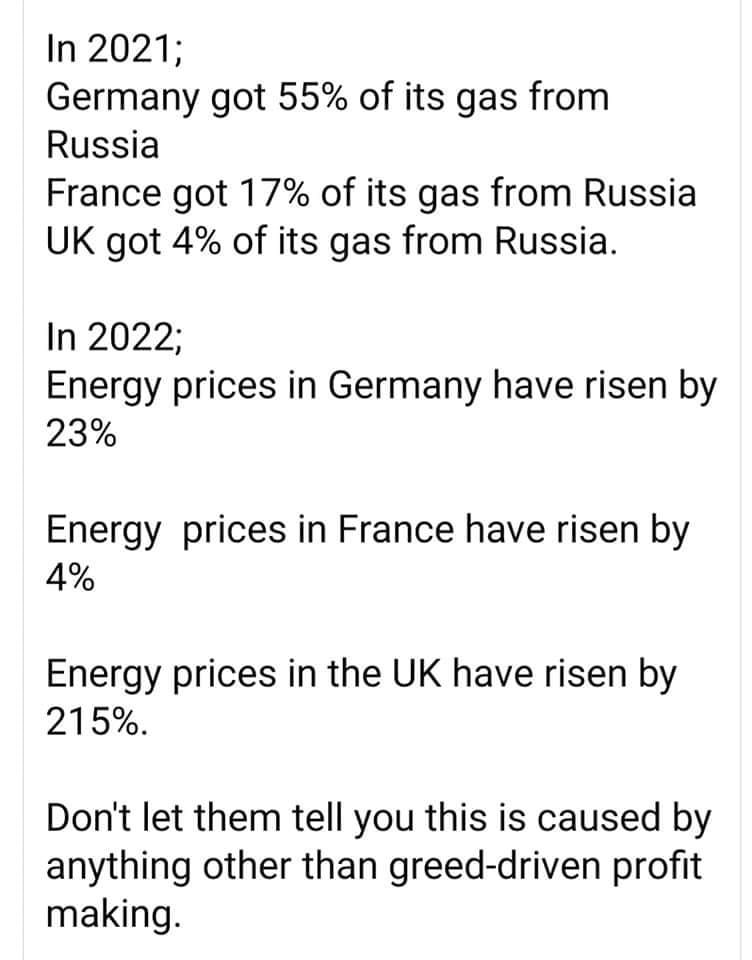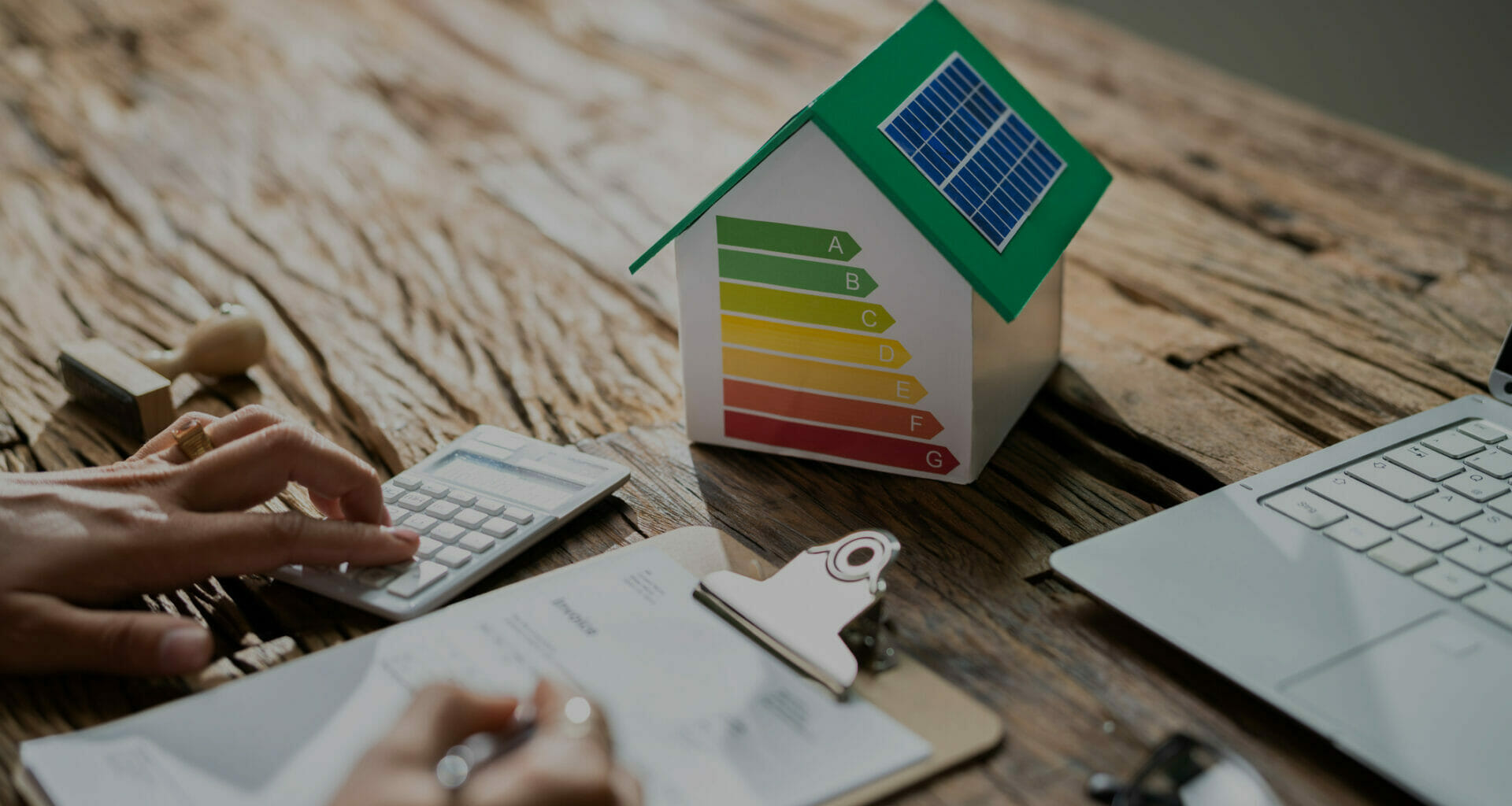The energy crisis has affected countries across Europe, and comparisons are being made between the responses of different nations to the increase in bills.
One image contrasting the reliance of the UK, France and Germany on Russian gas to the countries’ respective energy bills has been shared across social media.
The post had more than 22,000 interactions on Facebook alone, and was shared widely across other platforms.

Ferret Fact Service looked at this claim and found it Half True.

Evidence
Wholesale energy prices have increased across Europe. This is a result of volatility in gas markets caused by a number of factors, which have driven up energy bills.
The most recent increase in wholesale prices has been linked to the Russian attack on Ukraine. This resulted in energy supply issues as countries reduced or ended their gas imports from Putin’s regime, which is a major supplier of gas to Europe.
In late August, Russia announced that the Nord Stream 1 gas pipeline to Germany would be closed for three days for maintenance, further destabilising gas prices.
In the UK, the Office of Gas and Electricity Markets (Ofgem) regulates domestic energy markets and bills. The price cap for energy bills was set at £3,549 per year for dual fuel by October 2022, with estimates suggesting the cap could rise to more than £6,000 by next year. However, new Prime Minister Liz Truss has now capped bills for households at £2,500 until 2024.
How much gas comes from Russia?
The viral graphic claims that Germany got 55 per cent of its gas from Russia, while France got 17 per cent and the UK got just four per cent.
Figures from the UK Government show 3.7 per cent of the UK’s gas supply in 2021 did come from Russia, as well as 17.5 per cent of diesel, and 34.4 per cent of coal.
For Germany, 55 per cent of imports are from Russia while figures from data intelligence firm ICIS, reported by Reuters, showed in December 2021, 32 per cent of Germany’s overall gas supply was from Russia.
In France, 17 per cent of gas supply was from Russia in 2020. Figures for 2021, showed 15 per cent was coming from Russia.
It should be noted that energy prices for different countries are not directly linked to reliance on Russian gas.
The Russian invasion of Ukraine, together with a number of pre-existing issues, has pushed up wholesale prices across Europe.
Countries which import a lot of energy, such as the UK, are particularly exposed to these price rises and the changes in the wholesale market.
Prices are also affected by the different ways in which countries structure and regulate their gas markets. This has been seen in the array of mitigation measures put in place to combat higher bills across Europe.
How have energy bills changed?
The image claims that in 2022 energy prices have risen in Germany by 23 per cent, in France by four per cent, and in the UK by 215 per cent.
The information on energy price increases in the graphic appears to come from news website Novara Media.
In a post on Instagram, Novara compared energy bill increases from 2021 to 2022, stating that the UK had increased energy bills by 215 per cent.
The price cap covering the start of 2022, which was brought in during October 2021 was £1,277. The price cap due to come in from October 2022 would have been £3,549. This is a 178 per cent increase. After the UK Government’s announcement of a £2,500 cap on prices, the increase will be 96 per cent.
In France, prices are regulated to increase no more than four per cent.
Germany’s energy bills have increased significantly. Gas prices for average households increased by more than 100 per cent between December 2021 and August 2022, according to German energy price comparison site Verivox.
For electricity bills, the price increased by 51 per cent in the last year up to August 2022, Verivox reports.
The German government has also announced a package of assistance with energy bills, including a windfall tax on energy companies, one-off payments for citizens, and plans for a “price brake” in future.
How much are energy companies making?
A number of energy companies have announced profits during the crisis, which has led to controversy. The UK Government has already announced a one-off windfall tax, the energy profits levy, which they say will raise £5bn from energy firms in its first year. New Prime Minister Liz Truss has rejected a fresh tax on energy generators, saying it would “will put off investors”.
While many energy companies are not making significant profits from energy supply business, due to the increasing wholesale price and Ofgem’s cap on profit margins, those who are involved in energy generation and trading are able to take advantage of the high wholesale price.
A windfall tax on energy firms has also been announced in Germany as part of a raft of measures aimed at tackling the cost of living.
Ferret Fact Service verdict: Half True
Some of the graphic’s figures, such as those on the percentage of gas imported by the UK, Germany and France from Russia are broadly correct. It is also true that France’s energy bill increases have been capped at four per cent.
However, the increase in UK energy bills this was due to be 178 per cent rather than 215 per cent, and has now been capped at 96 per cent. Germany’s energy bill increases are more than 100 per cent higher than last year rather than 23 per cent.
The recent increases in countries’ energy bills is not directly linked to their relative reliance on gas from Russia,

Photo credit: iStock/AndreyPopov














